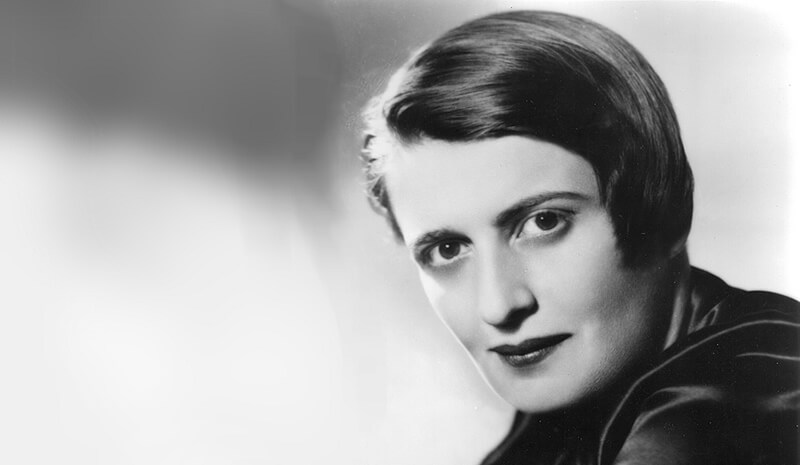The writers at The Washington Post would have us believe that Donald Trump’s cabinet picks are like heroes from the pages of Ayn Rand’s novels (“The Daily 202: Ayn Rand-acolyte Donald Trump stacks his cabinet with fellow objectivists“).
Yet if one reads Ayn Rand’s fiction (Atlas Shrugged, We The Living, and The Fountainhead) and non-fiction (Capitalism: The Unknown Ideal, Philosophy: Who Needs It, and The Virtue of Selfishness: A New Concept of Egoism) one discovers that in the world of Ayn Rand: Trump would be a villain (perhaps a minor villain, but a villain none the less).
Most people are aware of Trump’s beliefs, but what of Ayn Rand’s?
What did Ayn Rand believe?
Ayn Rand was an advocate of voluntary trade for mutual gain and benefit in both material and spiritual values. Quoting from Atlas Shrugged:
“The principle of trade is the only rational ethical principle for all human relationships, personal and social, private and public, spiritual and material. It is the principle of justice.”[1]
Rand correctly observed that such a voluntary trade is a win-win situation.
The application of this individualistic principle internationally made Ayn Rand an advocate of free trade between free countries (unilaterally if necessary). Quoting Rand:
“The essence of capitalism’s foreign policy is free trade—i.e., the abolition of trade barriers, of protective tariffs, of special privileges—the opening of the world’s trade routes to free international exchange and competition among the private citizens of all countries dealing directly with one another.” [2]
In her view, countries to not trade, but actual people do. (Rand did support embargos with statist countries at the time like Soviet Russia and Communist China and Cuba).
Ayn Rand was for liberal immigration, especially for productive individuals (she would have no limits on H-1B visas). As an immigrant, under Trump’s policies, she would probably have died in a Socialist Russia concentration camp rather than coming to the U.S. According to Rand:
You don’t know my conception of self-interest. No one has the right to pursue his self-interest by law or by force, which is what you’re suggesting. You want to forbid immigration on the grounds that it lowers your standard of living — which isn’t true, though if it were true, you’d still have no right to close the borders. You’re not entitled to any “self-interest” that injures others, especially when you can’t prove that open immigration affects your self-interest. You can’t claim that anything others may do — for example, simply through competition — is against your self-interest. But above all, aren’t you dropping a personal context? How could I advocate restricting immigration when I wouldn’t be alive today if our borders had been closed?[3]
Ayn Rand was a principled defender of free speech for both corporations and students, as a corporation speaking against statist policies, or a college student burning an American flag, are violating the rights of no one. Quoting Rand:
“The communists and the Nazis are merely two variants of the same evil notion: collectivism. But both should be free to speak—evil ideas are dangerous only by default of men advocating better ideas.”
Ayn Rand was a fiery opponent of racism, which she regarded as a species of collectivism, that — like fascism and communism — unjustly benefits the chosen group at the expense of individual rights. Writes Rand on racism:
Racism is the lowest, most crudely primitive form of collectivism. It is the notion of ascribing moral, social or political significance to a man’s genetic lineage — the notion that a man’s intellectual and characterological traits are produced and transmitted by his internal body chemistry. Which means, in practice, that a man is to be judged, not by his own character and actions, but by the characters and actions of a collective of ancestors.
[…]
There is only one antidote to racism: the philosophy of individualism and its politico-economic corollary, laissez-faire capitalism.
Individualism regards man — every man — as an independent, sovereign entity who possesses an inalienable right to his own life, a right derived from his nature as a rational being. Individualism holds that a civilized society, or any form of association, cooperation or peaceful coexistence among men, can be achieved only on the basis of the recognition of individual rights — and that a group, as such, has no rights other than the individual rights of its members.[4]
Ayn Rand was an uncompromising defender of a women’s right to abortion who would make feminists blush. Quoting Rand:
“Abortion is a moral right—which should be left to the sole discretion of the woman involved; morally, nothing other than her wish in the matter is to be considered. Who can conceivably have the right to dictate to her what disposition she is to make of the functions of her own body?”[5]
As a non-militant atheist, Ayn Rand was philosophically for reason and opposed to faith (“blind belief, belief unsupported by, or contrary to, the facts of reality and the conclusions of reason”) which she regarded as the “negation of reason”:
“Faith, as such, is extremely detrimental to human life: it is the negation of reason. But you must remember that religion is an early form of philosophy, that the first attempts to explain the universe, to give a coherent frame of reference to man’s life and a code of moral values, were made by religion, before men graduated or developed enough to have philosophy. And, as philosophies, some religions have very valuable moral points. They may have a good influence or proper principles to inculcate, but in a very contradictory context and, on a very—how should I say it?—dangerous or malevolent base: on the ground of faith.”[6]
Rand also opposed religion’s moral code of self-sacrifice (altruism) which she saw as the logical result of a morality based on faith:
“Christ, in terms of the Christian philosophy, is the human ideal. He personifies that which men should strive to emulate. Yet, according to the Christian mythology, he died on the cross not for his own sins but for the sins of the nonideal people. In other words, a man of perfect virtue was sacrificed for men who are vicious and who are expected or supposed to accept that sacrifice. If I were a Christian, nothing could make me more indignant than that: the notion of sacrificing the ideal to the nonideal, or virtue to vice. And it is in the name of that symbol that men are asked to sacrifice themselves for their inferiors. That is precisely how the symbolism is used.” [7]
Ayn Rand was for the sanctity of property rights and would have nothing but contempt for Trump’s securing property via eminent domain. Quoting Ayn Rand:
“The right to life is the source of all rights—and the right to property is their only implementation. Without property rights, no other rights are possible. Since man has to sustain his life by his own effort, the man who has no right to the product of his effort has no means to sustain his life. The man who produces while others dispose of his product, is a slave.”[8]
Ayn Rand was a radical for laissez-faire capitalism (Trump is fundamentally for nationalism) that she even published a non-fiction book of essays, Capitalism: The Unknown Ideal. Quoting Rand:
“Capitalism has created the highest standard of living ever known on earth. The evidence is incontrovertible. The contrast between West and East Berlin is the latest demonstration, like a laboratory experiment for all to see. Yet those who are loudest in proclaiming their desire to eliminate poverty are loudest in denouncing capitalism. Man’s well-being is not their goal.” [9]
In all fairness, the Post piece does mention these views occasionally, but takes no time to explore them and properly “connect the dots.” Yet, at other times The Post makes patently false claims, such as, “Roark, the character Trump says he identifies with, rapes a woman in The Fountainhead,” when in fact, Ayn Rand described that scene as a “rape by engraved invitation,” i.e., consensual sex. This is a grave disservice to Post readers.
Ayn Rand was a philosopher advocating the supremacy of reason, egoism, and capitalism
Ayn Rand was not just one of the great literati of the 20th century; she is now recognized by those in the philosophy profession as one of its most important philosophers who accomplished the feat of bringing up to date the fundamentals of Aristotle’s nature-based, egoistic philosophy for life in the 20th century. Those interested in a comprehensive academic treatment of Rand scholarship should peruse A Companion to Ayn Rand (Blackwell Companions to Philosophy.
So, what is an Objectivist?
In Ayn Rand’s words: “My philosophy, Objectivism, holds that…”
1. Reality exists as an objective absolute—facts are facts, independent of man’s feelings, wishes, hopes or fears.
2. Reason (the faculty which identifies and integrates the material provided by man’s senses) is man’s only means of perceiving reality, his only source of knowledge, his only guide to action, and his basic means of survival.
3. Man—every man—is an end in himself, not the means to the ends of others. He must exist for his own sake, neither sacrificing himself to others nor sacrificing others to himself. The pursuit of his own rational self-interest and of his own happiness is the highest moral purpose of his life.
4. The ideal political-economic system is laissez-faire capitalism. It is a system where men deal with one another, not as victims and executioners, nor as masters and slaves, but as traders, by free, voluntary exchange to mutual benefit. It is a system where no man may obtain any values from others by resorting to physical force, and no man may initiate the use of physical force against others. The government acts only as a policeman that protects man’s rights; it uses physical force only in retaliation and only against those who initiate its use, such as criminals or foreign invaders. In a system of full capitalism, there should be (but, historically, has not yet been) a complete separation of state and economics, in the same way and for the same reasons as the separation of state and church.[10]
Ayn Rand did not view individual rights as self-evident; rather, the concept of individual rights flowed from the fact that one’s survival and flourishing (life) in a social context requires the equal freedom to act by one’s mind (reason). Or, in her words:
“I am not primarily an advocate of capitalism, but of egoism; and I am not primarily an advocate of egoism, but of reason. If one recognizes the supremacy of reason and applies it consistently, all the rest follows. This—the supremacy of reason—was, is and will be the primary concern of my work, and the essence of Objectivism.” [11]
Ayn Rand was the 20th century’s greatest advocate of freedom
In Rand’s view, there are only two ways people can deal with each other: by force (physical coercion) or reason (peaceful persuasion). The job of the government is to use the first to protect the second. The government’s role is to protect individual rights by banning the initiation (starting) of physical force (which is the only way rights can be violated), and otherwise to leave the individual free to act in their economic and non-economic affairs. Ayn Rand regarded individual rights not as permissions to be regulated at government whim, but as inalienable.
This is why those associated with the so-called Alt-Right, like Steve Bannon, and those on the equally bigoted Regressive-Left. They despise and defame Ayn Rand because their vision of a government-regulated world requires the threat and initiation of physical force by the state. Both the Alt-Right and the Regressive-Left regard rights as alienable privileges to be violated and dispensed with as their ideology sees fit. To the Alt-Right and Regressive Left, Ayn Rand is a mortal enemy.
I believe that Ayn Rand would oppose both the “Alt-Right” and the “Progressive Regressive Left” in the 21st century, just as she opposed the communists/socialists (left) and fascists/nationalists (right) in the 20th century. She would oppose them all for the same reason: their opposition to individualism and capitalism and their advocacy of collectivism and statism.
“The conservatives want freedom to act in the material realm; they tend to oppose government control of production, of industry, of trade, of business, of physical goods, of material wealth. But they advocate government control of man’s spirit, i.e., man’s consciousness; they advocate the State’s right to impose censorship, to determine moral values, to create and enforce a governmental establishment of morality, to rule the intellect. The liberals want freedom to act in the spiritual realm; they oppose censorship, they oppose government control of ideas, of the arts, of the press, of education (note their concern with “academic freedom”). But they advocate government control of material production, of business, of employment, of wages, of profits, of all physical property — they advocate it all the way down to total expropriation.”
“The conservatives see man as a body freely roaming the earth, building sand piles or factories — with an electronic computer inside his skull, controlled from Washington. The liberals see man as a soul freewheeling to the farthest reaches of the universe — but wearing chains from nose to toes when he crosses the street to buy a loaf of bread.”[12]
The danger, of course, is that in the 21st century, the rubber terms of “Right” (Nationalism) and “Left” (Socialism) have begun to increasingly overlap. Today we see “the Left” increasingly oppose freedom in the spiritual realm with their opposition to freedom of speech and the “Right” for increasing state control of the economy.
Objectivists would regard Trump’s ideology as perverting his good policy positions
This is not to say that Rand would oppose all of Trump’s policy positions, but it is enough to show that Trump’s cabinet is not Objectivist.
Writes resident philosopher at the Ayn Rand Institute Onkar Ghate on Trump’s victory in his essay, “One Small Step for Dictatorship“:
“A Trump administration, if viewed out of the full context, may even enact some measures others and I would regard as positive, including improvements to the tax code and replacement of Obamacare with something less harmful. But it will be in the wrong way and for the wrong reasons. And even at this concrete level of policy, the Republican control of the presidency, the House and the Senate should give anyone pause who is concerned about, say, the campaign’s demonization of immigrants and of trade or the attempt to impose a Christian variant of Sharia law.” [13]
Being an Atlas Shrugged fan does not make one an Objectivist
In sum, reading and liking Atlas Shrugged — one of the greatest novels of the 20th century — does not make one someone an advocate of Ayn Rand’s philosophy no more than reading and liking the Koran and recommending it to a friend makes one a radical for Islam.
How the Washington Post writer implicitly conflates Donald Trump’s anti-freedom policies with Ayn Rand’s philosophy boggles the mind. In their list of Trump cabinet picks, there is but one true Ayn Rand hero — former BB&T CEO John Allison — whom Trump rejected.
If one wants to grasp Ayn Rand’s ideas in their totality, there is no better book then Leonard Peikoff’s Objectivism: The Philosophy of Ayn Rand. Objectivism: The Philosophy of Ayn Rand should be required reading for anyone who wishes to comment on Ayn Rand’s philosophy intelligently.
One does not have to agree with the arguments in Dr. Peikoff’s book, but at least one will not be attacking a straw man. Perhaps, then, an honest, intelligent discussion of Ayn Rand’s benevolent, life-enhancing human “philosophy for living on earth” can truly begin.
References
[1] Ayn Rand “The Objectivist Ethics” The Virtue of Selfishness: A New Concept of Egoism 31.
[2] Ayn Rand “The Roots of War,” Capitalism: The Unknown Ideal 39.
[3] Ayn Rand, Ayn Rand Answers: The Best of Her Q&A, Ed. Robert Mayhew, 25.
[4] Ayn Rand, “Racism“ The Virtue of Selfishness: A New Concept of Egoism. First published in The Objectivist Newsletter 1963.
[5] Ayn Rand, “Of Living Death” The Voice of Reason 58–59.
[6] Playboy Interview: Ayn Rand Playboy, March 1964.
[7] Playboy Interview: Ayn Rand Playboy, March 1964.
[8] Ayn Rand “Man’s Rights,” The Virtue of Selfishness: A New Concept of Egoism 94.
[9] Ayn Rand “Theory and Practice” Capitalism: The Unknown Ideal 136.
[10] Ayn Rand “Introducing Objectivism” The Objectivist Newsletter August 1962, 35.
[11] Ayn Rand “Brief Summary,” The Objectivist, Sept. 1971, 1
[12] Ayn Rand “Censorship: Local and Express” Philosophy: Who Needs It 186.
[13] Onkar Ghate “One Small Step for Dictatorship, November 17, 2016.



